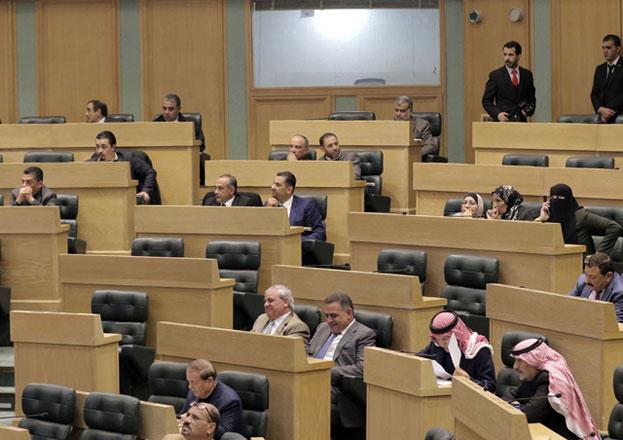You are here
Lower House budget deliberations continue for second day
By JT - Jan 14,2020 - Last updated at Jan 14,2020
AMMAN — Headed by speaker Atef Tarawneh, the Lower House on Monday continued its sessions for the second day in a row to discuss the state budget and the budgets of independent public institutions.
During the session, MP Mazen Qadi said that the House is required to approve a budget that reflects current challenges, such as high public debt.
Meanwhile, MP Riyadh Azzam called on the government to reduce the sales tax on basic commodities.
He also called on the government to address "distortions" in the pensions of retirees before 2012, and requested that in the future, increases be linked to inflation.
Azzam commented that there is a "big difference" in the amounts allocated in the budget to the Royal Medical Services (RMS) and the Ministry of Health, noting that the RMS serves about 38 per cent of Jordanians, while the Ministry of Health serves 42 per cent.
MP Rashid Al Shuha, for his part, said that internal and external challenges in the economic and political sectors result from successive governments' “failure” to implement the necessary economic reforms.
He added that this has resulted in "major imbalances" in the public budget deficit, and that the consequent accumulation of public debt and its interest also threatens economic stability.
Shuha also called on the government to “take corruption cases and Audit Bureau reports seriously”.
He also stressed the need to keep the Palestinian cause at the forefront and to maintain the Hashemite Custodianship over the holy sites in Jerusalem.
MP Ibrahim Bani Hani, for his part, said that the government's contracts with electricity companies were signed “without a detailed study of future prices and global changes in power generation”.
He also questioned why Jordan continues in contracts from 15 to 25 years ago.
"Who pays the price of excess electrical energy — estimated at 1,200 megawatts — which will increase after introducing the direct burning of oil shale to generate new energy?” he asked, noting that the cost of a kilowatt of solar energy is 1.7 piasters.
Bani Hani also thanked the government for following Royal directives regarding raising the salaries of public sector employees and retirees.
He noted that health services provided by the government, although they constitute 8.12 per cent of total public expenditures, are not expected to improve overall health services provided to citizens without partnering with services from the Ministry of Health, Royal Medical Services, public independent university hospitals and Prince Hamzah Public Hospital.
During the session, MP Habis Fayez stressed that the underprivileged are unable to pay their bills for water, electricity, gas and food, adding that the middle class is also grappling with high costs of living.
He stressed that economic conditions in the Kingdom, instead of improving, are on a decline, and that the local economy is receding "day by day", noting that despite the government's attempt to reduce expenditures and fight corruption, no improvement in economic conditions have come out of those efforts.
Fayez pointed to shops and factories that are shutting down, and "many investors who have closed their projects and moved to other countries".
He asked the government to support the agricultural sector, exempt the materials used by the sector from taxes and fees and cancel interest on loans granted to farmers.
For his part, MP Barakat Nimr Abadi endorsed the recommendations of the Lower House Financial Committee, saying: "We are still waiting for the government to merge and cancel independent bodies, which consume approximately JD3 billion of public money," describing the government's response as "timid and careful".
Abadi stressed the necessity of forming a fundamental strategy to eliminate red tape, administrative slack, favouritism, bribery and corruption, calling for the formation of a committee headed by an independent party to review privatisation files and agreements related to energy, free economic zones, independent bodies and the selling of state institutions and assets.
Related Articles
AMMAN — The Lower House on Wednesday continued its deliberations over the 2019 state budget draft law and the budgets of independent public
AMMAN — The Lower House on Sunday began its deliberations over the draft 2020 state budget law and the budgets of independent public institu
AMMAN — The Lower House on Monday embarked on deliberating the 2022 draft state budget and the 2022 draft budgets of independent public inst


















